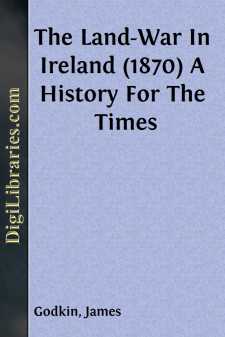Categories
- Antiques & Collectibles 13
- Architecture 36
- Art 48
- Bibles 22
- Biography & Autobiography 813
- Body, Mind & Spirit 142
- Business & Economics 28
- Children's Books 15
- Children's Fiction 12
- Computers 4
- Cooking 94
- Crafts & Hobbies 4
- Drama 346
- Education 46
- Family & Relationships 57
- Fiction 11828
- Games 19
- Gardening 17
- Health & Fitness 34
- History 1377
- House & Home 1
- Humor 147
- Juvenile Fiction 1873
- Juvenile Nonfiction 202
- Language Arts & Disciplines 88
- Law 16
- Literary Collections 686
- Literary Criticism 179
- Mathematics 13
- Medical 41
- Music 40
- Nature 179
- Non-Classifiable 1768
- Performing Arts 7
- Periodicals 1453
- Philosophy 64
- Photography 2
- Poetry 896
- Political Science 203
- Psychology 42
- Reference 154
- Religion 513
- Science 126
- Self-Help 84
- Social Science 81
- Sports & Recreation 34
- Study Aids 3
- Technology & Engineering 59
- Transportation 23
- Travel 463
- True Crime 29
The Land-War In Ireland (1870) A History For The Times
by: James Godkin
Categories:
Description:
Excerpt
CHAPTER I.
INTRODUCTION.
As the hour approaches when the legislature must deal with the Irish Land question, and settle it, like the Irish Church question, once for all, attempts are redoubled to frighten the public with the difficulties of the task. The alarmists conjure up gigantic apparitions more formidable than those which encountered Bunyan's Pilgrim. Monstrous figures frown along the gloomy avenue that, leads up to the Egyptian temple in which the divinity, PROPERTY, dwells in mysterious darkness. To enter the sanctuary, we are solemnly assured, requires all the cardinal virtues in their highest state of development—the firmest faith, the most vivid hope, and the charity that never faileth. But this is not the only country that has had a land question to settle. Almost every nation in Europe has done for itself what England is now palled upon to do for Ireland. In fact, it is a necessary process in the transition from feudalism to constitutional self-government. Feudalism gave the land to a few whom it made princes and lords, having forcibly taken it from the many, whom it made subjects and serfs. The land is the natural basis of society. The Normans made it the artificial basis of a class. Society in nearly every other country has reverted back to its original foundations, and so remains firm and strong without dangerous rents or fissures. No doubt, the operation is difficult and critical. But what has been done once may be done again; and as it was England that kept Irish society so long rocking on its smaller end, it is her duty now to lend all her strength to help to seat it on its own broad foundations. Giving up the Viceroy's dreams that the glorious mission of Ireland was to be a kitchen garden, a dairy, a larder for England, we must come frankly to the conclusion that the national life of the Irish people, without distinction of creed or party, increases in vigour with their intelligence, and is now invincible. Let the imperial legislature put an end for ever to such an unnatural state of things—thus only can they secure the harmonious working and cordial Union of the two nations united together in one State—thus only can they insure for the landlords themselves all the power and all the influence that can be retained by them in consistency with the industrial rights and political freedom of the cultivators of the soil. These now complain of their abject dependence, and hopeless bondage, under grinding injustice. They are alleged to be full of discontent, which must grow with the intelligence and manhood of the people who writhe under the system. Their advocates affirm that their discontent must increase in volume and angry force every year, and that, owing to the connection of Ireland with the United States, it may at any time be suddenly swollen with the fury of a mountain torrent, deeply discoloured by a Republican element.
It must be granted, I fear, that the Celts of Ireland feel pretty much as the Britons felt under the ascendency of the Saxons, and as the Saxons in their turn felt under the ascendency of the Normans....


